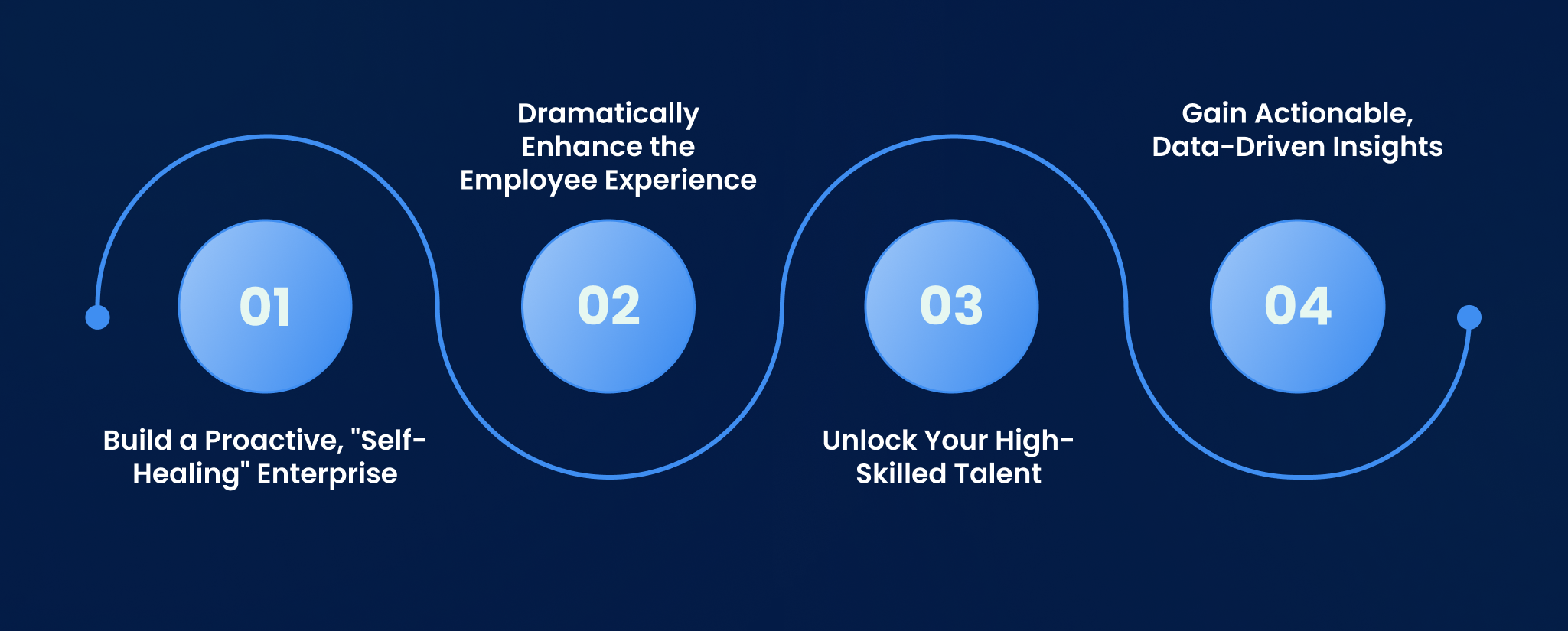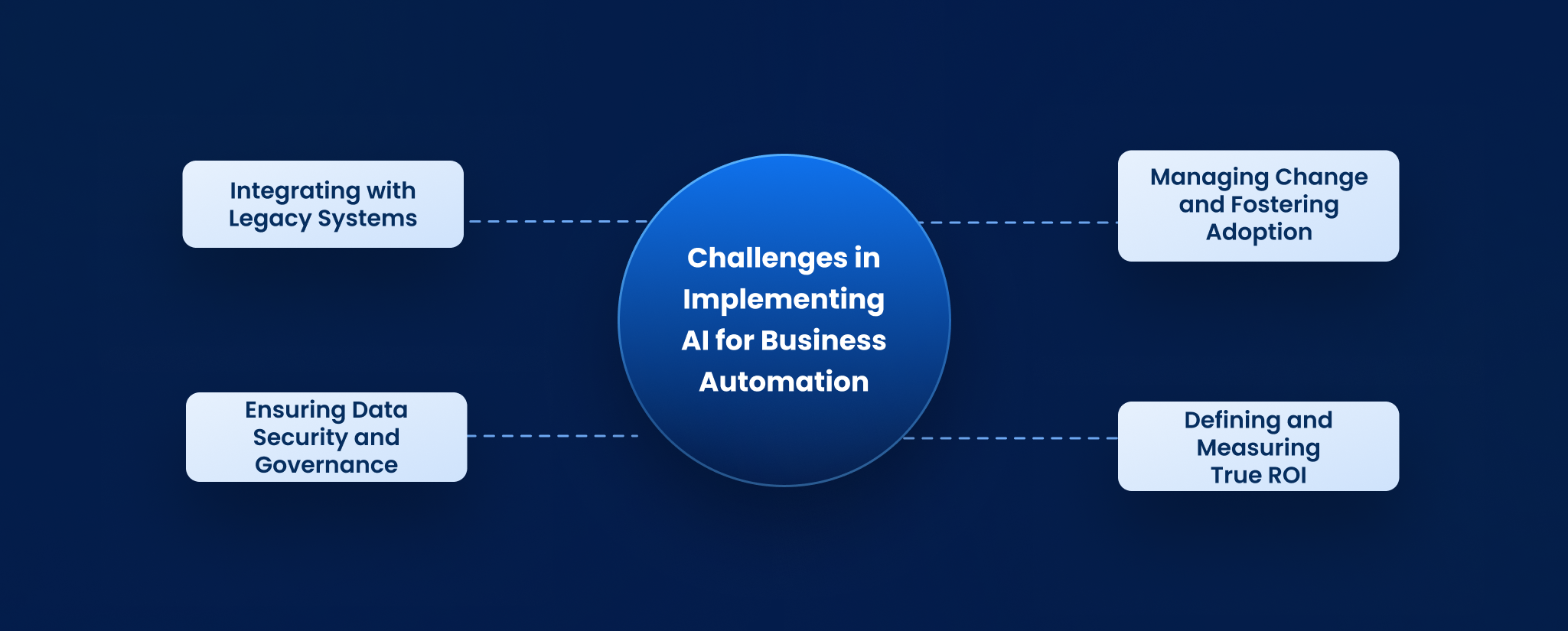Introduction
As a technology leader in a large American enterprise, you’re not just managing systems; you’re orchestrating a complex digital ecosystem. Your ticketing systems for IT, HR, and Finance are the nerve centers of your daily operations, but they’re often overloaded. You’re likely dealing with ticket backlogs, overwhelmed support teams, and employees frustrated by slow resolution times. The solution isn’t just more staff or better software, it’s a fundamental shift in strategy. For 2025 and beyond, that strategy is AI for Business Automation, a technology poised to move your support functions from a reactive cost center to a proactive, value-generating powerhouse.
This guide is designed for you. We’ll skip the technical jargon and focus on the strategic implications of AI for Business Automation, exploring how it works, the challenges it solves, and how you can leverage it to build a more resilient and efficient enterprise.
What is AI for Business Automation?
Let’s be clear: AI for Business Automation is not about basic chatbots that parrot pre-written scripts. Think of traditional automation as a metronome, perfectly executing the same task over and over. In contrast, AI for Business Automation is like an orchestra conductor. It doesn’t just keep time; it interprets the music, coordinates dozens of different instruments, and adapts its approach in real time to create a seamless performance.
At its core, it’s the use of intelligent systems that can understand, reason, act, and learn. These systems connect to your existing enterprise applications, like ServiceNow, Workday, or Oracle, to resolve complex, multi-step issues from start to finish without human intervention. This sophisticated form of automation is designed to handle the unpredictable nature of employee requests, making it a game-changer for internal support.
How AI for Business Automation Works
The magic lies in its ability to replicate and enhance human problem-solving. It’s a symphony of several advanced technologies working in concert.
First, it uses Natural Language Processing (NLP) to understand the nuances of human language. When an employee types, “My laptop’s VPN isn’t connecting, and I have a client call in 10,” the system doesn’t just see keywords. It understands the context, the urgency, and the underlying technical issue.
Next, it leverages Machine Learning (ML) to analyze historical ticket data, knowledge base articles, and past resolution notes. Consequently, it learns to identify patterns, predict problems, and determine the most effective solution for a specific request. This is how the system gets smarter and more accurate over time.
Finally, the most advanced form of AI for Business Automation uses Agentic AI. This is the action-oriented component. An AI Agent is an autonomous system that can navigate software, access databases, and execute tasks across multiple applications. It doesn’t just suggest a solution; it actively performs the steps to fix the problem. For example, it can diagnose the VPN issue, reset the configuration, and verify the connection, all while keeping the employee updated. This comprehensive approach is what makes modern AI for Business Automation so powerful.
Key Benefits of Using AI for Business Automation
Implementing a robust AI for Business Automation strategy delivers benefits that extend far beyond simply closing tickets faster. It fundamentally changes how your support functions operate and creates cascading value across the organization.
- Build a Proactive, “Self-Healing” Enterprise: The most significant advantage is the shift from reactive to proactive support. By analyzing system-wide data, the AI can detect anomalies and resolve potential issues before an employee even notices a problem. For instance, it might identify a server that’s about to fail and trigger a remediation process, preventing a flood of tickets and costly downtime.
- Dramatically Enhance the Employee Experience: In today’s competitive talent market, the quality of internal support matters. AI for Business Automation provides instant, 24/7 resolutions. Employees are no longer stuck waiting in a queue for simple requests like a password reset or a software license. This frictionless experience boosts productivity and morale.
- Unlock Your High-Skilled Talent: Your IT and HR professionals are valuable strategic assets. Unfortunately, they often spend a majority of their day handling repetitive, low-level tasks. Automating these requests frees them to focus on high-impact projects like infrastructure upgrades, security initiatives, or strategic talent development.
- Gain Actionable, Data-Driven Insights: Every support ticket is a data point. AI for Business Automation platforms analyze thousands of these interactions to uncover root causes. You can finally get clear answers to questions like, “Why are we getting so many payroll questions at the end of every quarter?” These insights allow you to fix underlying process flaws, not just treat the symptoms.

Common Use Cases in Enterprises
The applications of AI for Business Automation span every support function within a large enterprise. Here are a few common examples that illustrate its versatility:
-
IT Service Management: Imagine an employee needs access to a specific application for a project. Instead of filing a ticket and waiting for manual approval and provisioning, they simply make a request through a chat interface. The AI Agent verifies their role, checks the licensing, gets automated approval from their manager via email or Teams, and then provisions the software directly. The entire process takes minutes, not days.
-
Human Resources: Onboarding a new hire involves dozens of small tasks across multiple departments. An AI Agent can orchestrate this entire workflow. It can grant access to necessary systems, enroll the new hire in benefits, answer their questions about company policy, and schedule orientation meetings, ensuring a smooth and welcoming Day One experience.
-
Finance: Expense report inquiries are a classic time-sink for finance teams. An AI agent can instantly answer questions like, “What’s the status of my report?” or “What’s the per diem for travel to Chicago?” It can also autonomously flag out-of-policy expenses and guide employees on how to correct them, reducing manual review cycles.
These examples highlight how AI for Business Automation handles the full lifecycle of a request, from initial query to final resolution.
Challenges in Implementing AI for Business Automation
While the promise is immense, deploying AI for Business Automation in a large, complex environment requires a thoughtful approach. As a technology leader, you need to be prepared for these common hurdles:
- Integrating with Legacy Systems: Your tech stack is likely a mix of modern cloud applications and entrenched, custom-built legacy systems. A successful AI solution must be able to communicate seamlessly with both, using robust APIs and integration frameworks to avoid creating yet another data silo.
- Ensuring Data Security and Governance: These AI systems need access to sensitive employee and company data to be effective. Therefore, choosing a platform with enterprise-grade security, robust data privacy controls, and a clear governance model is non-negotiable.
- Managing Change and Fostering Adoption: Employees and support teams may be skeptical of AI. A successful implementation requires a strong change management plan. It’s crucial to communicate that the goal is to augment human capabilities, not replace them, allowing teams to focus on more interesting and strategic work.
- Defining and Measuring True ROI: The value of AI for Business Automation goes far beyond ticket deflection rates. To build a compelling business case, you must also measure its impact on employee productivity, speed of resolution, and overall operational efficiency.

How Leena AI Enables Business Automation with AI
At Leena AI, we’ve built our platform to solve these exact challenges. We are pioneers in a specialized field of AI for Business Automation called Agentic AI in IT. We don’t just build chatbots; we create autonomous AI Agents, digital teammates that are designed to resolve complex enterprise issues from end to end.
Our AI Agents are purpose-built for the enterprise. They come with pre-built integrations for hundreds of the most common business applications, including ServiceNow, SAP, Oracle, and Workday. This “plumbed-in” approach drastically reduces implementation time and ensures seamless communication, even with legacy systems.
Here’s how Leena AI creates value:
- Autonomous Resolution: Our AI Agents don’t just find answers; they take action. For a common IT issue like a laptop running slow, our agent can perform a series of diagnostic steps autonomously: check for memory-hogging applications, clear the cache, and run security scans. If the issue persists, it can intelligently escalate to a human agent with all the diagnostic information already gathered. This is the power of a true AI for Business Automation solution.
- Orchestration Across Departments: Many employee issues aren’t confined to a single department. A promotion, for instance, involves HR (title change), IT (new permissions), and Finance (payroll adjustment). Leena AI’s platform can orchestrate this entire cross-functional workflow, ensuring all tasks are completed in the correct sequence.
- Rapid Time-to-Value: Because our AI Agents are pre-trained on millions of real-world enterprise support tickets, they can start delivering value in weeks, not years. This allows you to demonstrate a clear and rapid return on your investment in AI for Business Automation.
The Future of AI and Business Automation
The trajectory of AI for Business Automation is pointing towards a future of “hyperautomation,” where a fabric of different technologies, AI, machine learning, and process automation, work together to automate and optimize nearly every facet of the business.
We will see the rise of highly specialized AI Agents for every business function, acting as autonomous team members that handle the bulk of operational tasks. The goal is to create an enterprise environment where support is predictive, ambient, and so seamless that employees rarely even need to ask for help. This evolution will further solidify the strategic importance of AI for Business Automation for any forward-thinking company.
Ultimately, embracing AI for Business Automation is about building a more agile, resilient, and human-centric organization. By automating the mundane, you empower your people to do what they do best: innovate, collaborate, and drive your business forward.
Frequently Asked Questions (FAQs)
How is AI for Business Automation different from traditional RPA (Robotic Process Automation)?
Traditional RPA is great for automating simple, rules-based tasks that don’t change. In contrast, AI for Business Automation is designed for variability. It uses AI to understand context, make decisions, and handle complex processes that require judgment, making it far more powerful for dynamic environments like IT and HR support.
What's the first step to implementing AI for Business Automation in a large company?
Start with a high-volume, low-complexity use case to demonstrate value quickly. Common starting points include password resets in IT or benefits enrollment questions in HR. A successful pilot builds momentum and helps secure buy-in for a broader AI for Business Automation strategy.
Can AI for Business Automation integrate with our custom-built legacy software?
Yes, but this is a critical differentiator among vendors. Look for a platform that offers robust, API-first integration capabilities. Top-tier AI for Business Automation solutions are designed to connect with both modern and legacy systems to ensure a unified workflow.
How do you ensure data security with AI for Business Automation?
Enterprise-grade security is paramount. A reliable platform will have certifications like SOC 2 and ISO 27001, employ robust data encryption both in transit and at rest, and provide granular role-based access controls to ensure that the AI only accesses the information it absolutely needs.
Agentic AI is the next evolution. It refers to an autonomous AI system that can not only understand and plan but also execute multi-step tasks across different applications to achieve a goal. It’s the difference between a system that tells you how to fix a problem and one that goes in and fixes it for you, which is the core of a truly effective AI for Business Automation solution.
How do we measure the success of an AI for Business Automation project?
Success metrics should include both quantitative and qualitative data. Track hard metrics like first-contact resolution rate, average time to resolution, and cost per ticket. Also, measure qualitative improvements through employee satisfaction surveys (CSAT/NPS) to capture the full impact of your AI for Business Automation investment.
Is implementing AI for Business Automation a lengthy and difficult process?
It doesn’t have to be. Modern platforms, especially those like Leena AI that use pre-trained models and pre-built integrations, can be deployed much faster than traditional enterprise software. The key is to choose a partner with deep expertise in your industry and a proven methodology for deploying AI for Business Automation at scale.













